Related Research Articles
One-nation conservatism, also known as one-nationism or Tory democracy, is a paternalistic form of British political conservatism. It advocates the preservation of established institutions and traditional principles within a political democracy, in combination with social and economic programmes designed to benefit the ordinary person. According to this political philosophy, society should be allowed to develop in an organic way, rather than being engineered. It argues that members of society have obligations towards each other and particularly emphasises paternalism, meaning that those who are privileged and wealthy should pass on their benefits. It argues that this elite should work to reconcile the interests of all social classes, including labour and management, rather than identifying the good of society solely with the interests of the business class.

William Henry Beveridge, 1st Baron Beveridge, was a British economist and Liberal politician who was a progressive and social reformer who played a central role in designing the British welfare state. His 1942 report Social Insurance and Allied Services served as the basis for the welfare state put in place by the Labour government elected in 1945.

The welfare state of the United Kingdom began to evolve in the 1900s and early 1910s, and comprises expenditures by the government of the United Kingdom of Great Britain and Northern Ireland intended to improve health, education, employment and social security.
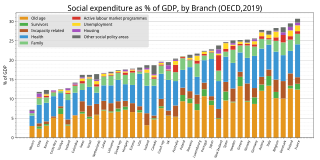
A welfare state is a form of government in which the state protects and promotes the economic and social well-being of its citizens, based upon the principles of equal opportunity, equitable distribution of wealth, and public responsibility for citizens unable to avail themselves of the minimal provisions for a good life.

Welfare, or commonly social welfare, is a type of government support intended to ensure that members of a society can meet basic human needs such as food and shelter. Social security may either be synonymous with welfare, or refer specifically to social insurance programs which provide support only to those who have previously contributed, as opposed to social assistance programs which provide support on the basis of need alone. The International Labour Organization defines social security as covering support for those in old age, support for the maintenance of children, medical treatment, parental and sick leave, unemployment and disability benefits, and support for sufferers of occupational injury.

Laurent Fabius is a French politician serving as President of the Constitutional Council since 8 March 2016. A member of the Socialist Party, he previously served as Prime Minister of France from 17 July 1984 to 20 March 1986. Fabius was 37 years old when he was appointed and is, so far, the youngest Prime Minister of the Fifth Republic.
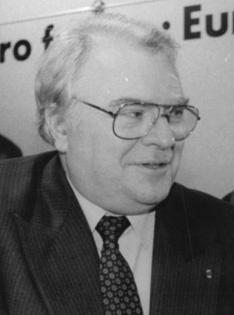
Pierre Mauroy was a French Socialist politician who was Prime Minister of France from 1981 to 1984 under President François Mitterrand. Mauroy also served as Mayor of Lille from 1973 to 2001. At the time of his death Mauroy was the emeritus mayor of the city of Lille. He died from complications of lung cancer on 7 June 2013 at the age of 84. He is the namesake of Lille's new stadium, Stade Pierre-Mauroy.
Welfare capitalism is capitalism that includes social welfare policies and/or the practice of businesses providing welfare services to their employees. Welfare capitalism in this second sense, or industrial paternalism, was centered on industries that employed skilled labor and peaked in the mid-20th century.
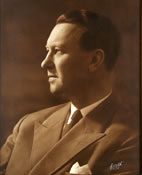
Hans Christian Svane Hansen, often known as H. C. Hansen or simply H. C., was a Danish politician who served as Prime Minister of Denmark from 1955 until his death in 1960. A Social Democrat, Hansen served as finance minister in the unity cabinet from May to November 1945 and again from 1947 to 1950 under Hans Hedtoft. He served as minister of industry, commerce and seafare in the final month of Hedtoft's first cabinet, and later became foreign minister in 1953, and continued in this post during his own premiership until 1958. He was elected leader of his party following the death of Hedtoft.

Clement Attlee was invited by King George VI to form the Attlee ministry in the United Kingdom in July 1945, succeeding Winston Churchill as Prime Minister of the United Kingdom. The Labour Party had won a landslide victory at the 1945 general election, and went on to enact policies of what became known as the post-war consensus, including the establishment of the welfare state and the nationalisation of some industries. The government's spell in office was marked by post-war austerity measures, the violent crushing of pro-independence and communist movements in Malaya, the grant of independence to India, the engagement in the Cold War against Soviet Communism as well as the creation of the country's National Health Service (NHS).
Social welfare, assistance for the ill or otherwise disabled and the old, has long been provided in Japan by both the government and private companies. Beginning in the 1920s, the Japanese government enacted a series of welfare programs, based mainly on European models, to provide medical care and financial support. During the post-war period, a comprehensive system of social security was gradually established.
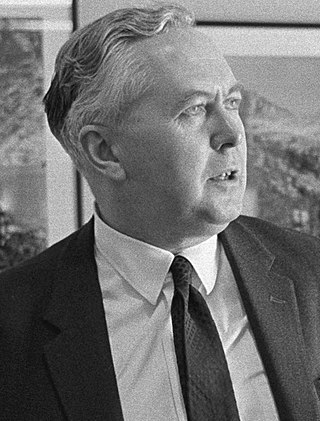
Harold Wilson was appointed Prime Minister of the United Kingdom by Queen Elizabeth II on 16 October 1964 and formed the first Wilson ministry, a Labour government, which held office with a thin majority between 1964 and 1966. In an attempt to gain a workable majority in the House of Commons, Wilson called a new election for 31 March 1966, after which he formed the second Wilson ministry, a government which held office for four years until 1970.

The National Insurance Act 1911 created National Insurance, originally a system of health insurance for industrial workers in Great Britain based on contributions from employers, the government, and the workers themselves. It was one of the foundations of the modern welfare state. It also provided unemployment insurance for designated cyclical industries. It formed part of the wider social welfare reforms of the Liberal Governments of 1906–1915, led by Henry Campbell-Bannerman and H. H. Asquith. David Lloyd George, the Liberal Chancellor of the Exchequer, was the prime moving force behind its design, negotiations with doctors and other interest groups, and final passage, assisted by Home Secretary Winston Churchill.

The Labour Party governed the United Kingdom of Great Britain and Northern Ireland from 1974 to 1979. During this period, Harold Wilson and James Callaghan were successively appointed as Prime Minister by Queen Elizabeth II. The end of the Callaghan ministry was presaged by the Winter of Discontent, a period of serious industrial discontent. This was followed by the election of Conservative leader Margaret Thatcher in 1979.
Social class in New Zealand is a product of both Māori and Western social structures. Researchers have traditionally discussed New Zealand, a first-world country, as a "classless society", but this claim is problematic in a number of ways. Since at least the 1980s it has become easier to distinguish between the wealthy and the underclass in New Zealand society.
Social democracy is a political, social, and economic philosophy within socialism that supports political and economic democracy. As a policy regime, it is described by academics as advocating economic and social interventions to promote social justice within the framework of a liberal-democratic polity and a capitalist-oriented mixed economy. The protocols and norms used to accomplish this involve a commitment to representative and participatory democracy, measures for income redistribution, regulation of the economy in the general interest, and social welfare provisions. Due to longstanding governance by social democratic parties during the post-war consensus and their influence on socioeconomic policy in Northern and Western Europe, social democracy became associated with Keynesianism, the Nordic model, the social-liberal paradigm, and welfare states within political circles in the late 20th century. It has been described as the most common form of Western or modern socialism, as well as the reformist wing of democratic socialism.
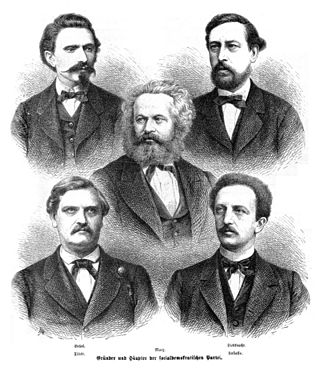
The foundation of the Social Democratic Party of Germany can be traced back to the 1860s, and it has represented the centre-left in German politics for much of the 20th and 21st centuries. From 1891 to 1959, the SPD theoretically espoused Marxism.
Welfare in France includes all systems whose purpose is to protect people against the financial consequences of social risks.

Occupational safety and health (OSH), also commonly referred to as occupational health and safety (OHS), occupational health, or occupational safety, is a multidisciplinary field concerned with the safety, health, and welfare of people at work. These terms also refer to the goals of this field, so their use in the sense of this article was originally an abbreviation of occupational safety and health program/department etc.
South Africa has one of the most extensive social welfare systems among developing countries in the world. In 2019, an estimated 18 million people received some form of social grant provided by the government.
References
- ↑ Wilkinson, Helen; Stephen Radley (1997). Time Out: The Costs and Benefits of Paid Parental Leave. Demos. p. 98. ISBN 1-898309-58-2.
- ↑ Johnson, Norman (1987). The Welfare State in Transition: The Theory and Practice of Welfare Pluralism . Univ of Massachusetts Press. p. 137. ISBN 0-87023-618-0.
- ↑ Mulgan, Geoff (1997). The British Spring: a manifesto for the election after next. Demos. p. 37. ISBN 1-898309-43-4.